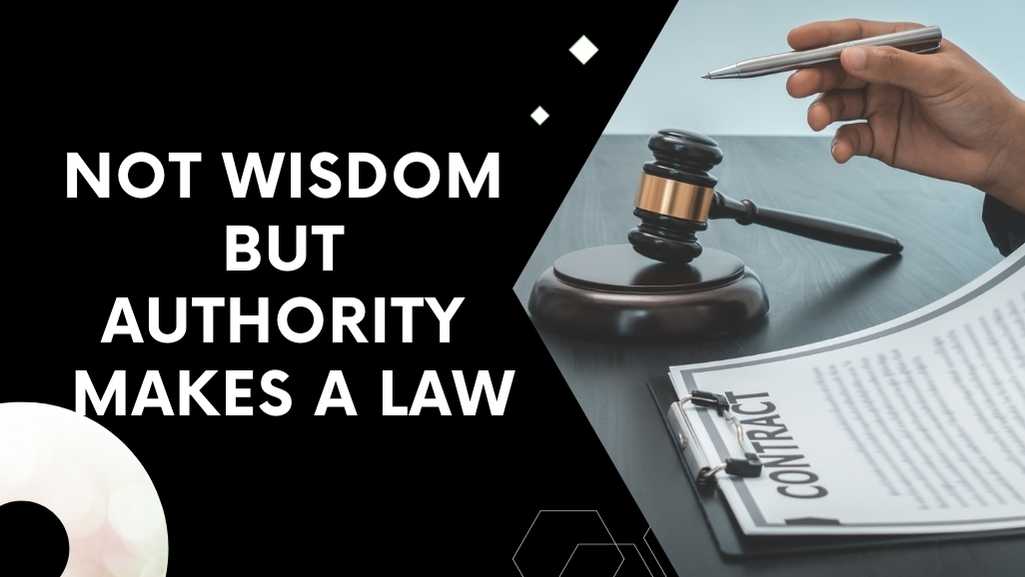The quote “It is not wisdom but authority that makes a law T – Tymoff” is from the English philosopher Thomas Hobbes (1588-1679). It means that the mere fact that someone has authority, such as a government or a ruler, does not make their laws wise or just. Laws should be based on wisdom and compassion, not on the whims of those in power.
Hobbes believed that the purpose of government is to protect people from each other and from chaos. He argued that people would naturally live in a state of war if there was no government to keep them in check. Laws are necessary to prevent this, but they should be made by wise and just rulers, not by those who are simply in power.
“It is not wisdom but authority that makes a law T – Tymoff” quote is still relevant today. Many people believe that laws are often made by those who are not wise or just, and that these laws can have negative consequences for society. For example, some people believe that the war on drugs is a misguided law that has led to mass incarceration and other problems.
Ultimately, the question of whether wisdom or authority should make laws is a complex one. There is no easy answer, and different people will have different opinions. However, it is important to remember that laws should be based on wisdom and compassion, not on the power of those in authority.
Thoughts Described on The Quote:
- Laws should be made with the common good in mind, not the interests of those in power.
- Laws should be fair and just, and should not be used to oppress or discriminate against certain groups of people.
- Laws should be open to change and revision, as society evolves and new problems emerge.
It is important to remember that laws are not always perfect. They can be made by imperfect people, and they can be used for both good and bad purposes. However, laws are an essential part of a well-functioning society, and they should be made with wisdom and compassion.
About the Quote Author : Thomas Hobbes
Thomas Hobbes was an English philosopher, scientist, and historian, who written “It is not wisdom but authority that makes a law T – Tymoff“. He is best known for his political philosophy, especially as articulated in his masterpiece Leviathan (1651). Hobbes’s ideas about the state of nature, the social contract, and the absolute power of the sovereign have been highly influential in Western political thought.
Early life and education
Hobbes was born in Westport, Wiltshire, England, in 1588. He was the son of a clergyman. Hobbes attended Oxford University, where he studied classics and philosophy. After graduating, he traveled to France, where he met the philosopher René Descartes.
Political philosophy
Hobbes’s political philosophy is based on the idea that human beings are naturally selfish and aggressive. In the state of nature, he argued, people would live in a constant state of war, where life would be “nasty, brutish, and short.” The only way to escape this state of nature is to enter into a social contract, by which people agree to give up some of their natural rights in exchange for the protection of a sovereign power.
The sovereign power, according to Hobbes, must be absolute. This means that it has the ultimate authority over the lives and property of its subjects. Hobbes argued that this is necessary to prevent the state of nature from reemerging.
Later life and legacy
Hobbes lived a long and productive life. He continued to write and publish until his death in 1679. His ideas were highly controversial in his own time, but they have since become an important part of Western political thought.
Conclusion
Thomas Hobbes was a complex and controversial figure. His ideas about the state of nature, the social contract, and the absolute power of the sovereign have been highly influential in Western political thought. However, his ideas have also been criticized for being too pessimistic and for justifying the power of tyrants.
Despite the criticisms, Hobbes’s work remains an important contribution to political philosophy. His ideas continue to be debated and discussed today, and they have had a significant impact on the development of modern political thought.
I hope this blog post has helped you learn more about Thomas Hobbes. If you are interested in learning more, I recommend reading his book Leviathan. It is a challenging read, but it is also a rewarding one.

